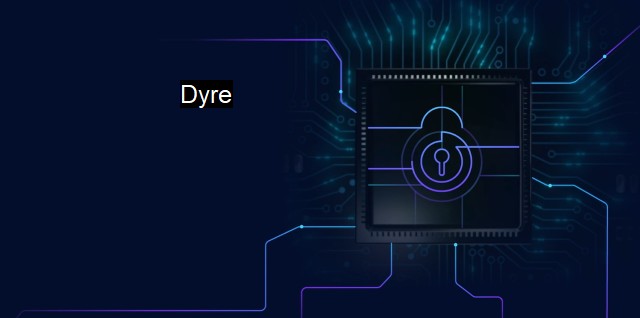What is Dyre?
Dyre: The Most Fearful Banking Trojan in the Cybersecurity Industry
"Dyre" , also known as Dyreza, is a notorious Trojan horse developed and used by a criminal group known for its specialization in direct attacks on corporate banking systems. This highly dangerous cyber-threat is voluminously covered by cybersecurity and antivirus experts due to its sophisticated functionality and significant impact on the digital world.Dyre is professional-grade malware designed to compromise various aspects of computer systems, primarily banking processes. By doing so, it achieves its main goal: financial fraud. Operationally, Dyre acts as a typical banking Trojan; it evolves continuously, always developing more refined and concealed techniques to bypass cybersecurity measures. That's why it is highly regarded for its evolutionary and dynamic nature in the cybersecurity world.
There are numerous ways that Dyre infects a computer, but most commonly, it happens through spear-phishing emails. These emails, disguised as legitimate messages from reputable entities, often contain compromised attachments that when opened, install the Dyre Trojan into the system. Besides emails, attackers can also exploit computer vulnerabilities to push Dyre malware into the targeted device.
When a system is first infected with Dyre, it typically lays dormant, hiding its presence while working silently in the background. When the user begins a session on an online banking platform, Dyre wakes accompanied by keystroke logging functionality to monitor and collect user details, including the user-ID, password, and other sensitive credential information of consumers, businesses, and banks. Dyre also has the capability to manipulate website content and even alter transaction details to serve its circumstances better.
In terms of cybersecurity, what sets Dyre apart from traditional banking Trojans is its so-called "Man-In-The-Browser" technique. This method allows the Trojan to bypass two-factor authentication, allowing cybercriminals to extract data from encrypted HTTPS sessions without setting off any alarms. Dyre is known for setting up its own secure sockets layer to encrypt its conversations with the control server, making it difficult for antivirus software to detect and diagnose its activity.
Note that modern antivirus software is very efficient at combating and neutralizing Trojans like Dyre. As of now, most premiere antivirus software vendors include Dyre recognition and suppression mechanisms in their suits that not only protect consumers but also extend protection to corporate systems as well.
The profound implications of Dyre is a stark reminder of the extent, sophistication, and potential financial damage of cybersecurity threats in the digital age. Attaining a comprehensive understanding and strong protection mechanism against the Dyre Trojan has become critical, especially for financial institutions.
Dyre exemplifies the ever-evolving world of cyber threats and the commitment of cybercriminals to adapt their techniques constantly. This demands individuals and corporations maintain an adequate and up-to-date cybersecurity strategy. It's reassuring that the scope, sophistication, and complexity of antivirus solutions are also evolving concurrently to provide a hopefully safer future in the digital realm.

Dyre FAQs
What is Dyre malware?
Dyre malware is a type of banking Trojan that operates by stealing login credentials, credit card information, and other sensitive data from victims. It typically spreads through phishing emails and is designed to infect Windows-based systems.How does Dyre malware work?
Dyre malware typically operates by stealing login credentials and other sensitive data from victims, primarily through a man-in-the-middle attack. After infecting a victim's computer, the malware intercepts data sent between the victim and their bank or other financial institution, allowing the attacker to steal account details and other information.How can I protect my system against Dyre malware?
To protect your system against Dyre malware, it's important to use reliable antivirus software, keep your operating system and other software up-to-date with the latest security patches, and be cautious when opening email attachments or clicking on links from unknown sources. It's also a good idea to use strong, unique passwords and enable two-factor authentication whenever possible.What should I do if I think my system has been infected with Dyre malware?
If you suspect that your system has been infected with Dyre malware, you should disconnect your computer from the internet immediately and run a full antivirus scan. It's also important to change any passwords that may have been compromised and monitor your bank and credit card accounts for any suspicious activity. In some cases, you may need to seek help from a professional cybersecurity firm to fully remove the malware and secure your system.| | A | | | B | | | C | | | D | | | E | | | F | | | G | | | H | | | I | | | J | | | K | | | L | | | M | |
| | N | | | O | | | P | | | Q | | | R | | | S | | | T | | | U | | | V | | | W | | | X | | | Y | | | Z | |
| | 1 | | | 2 | | | 3 | | | 4 | | | 7 | | | 8 | | |||||||